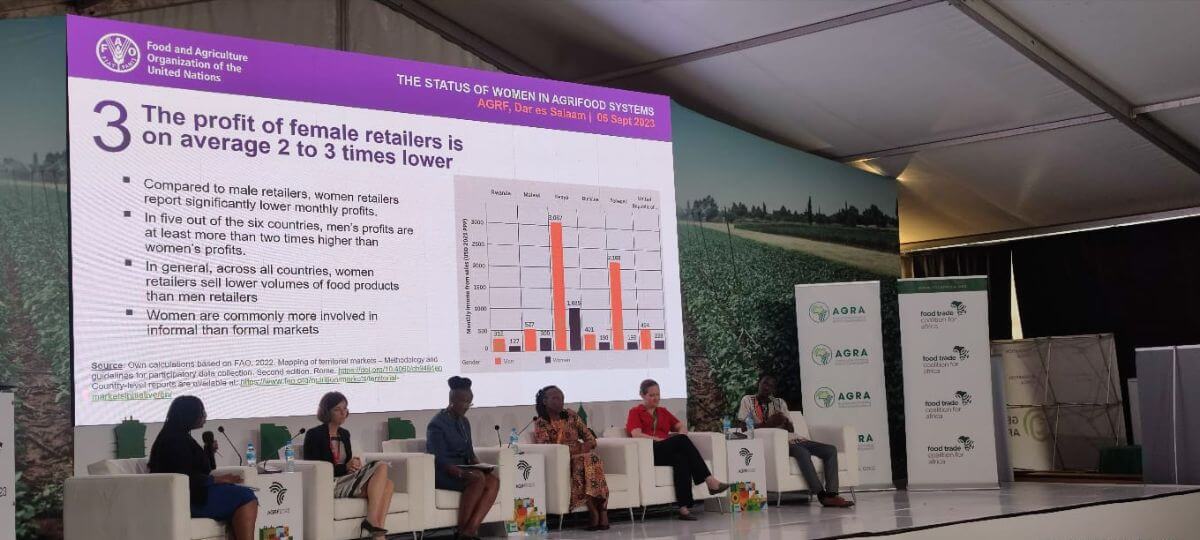The Food and Agriculture Organisation of the United Nations (FAO) in partnership with the Alliance for a Green Revolution in Africa (AGRA), TradeMark Africa (TMA) and Food Trade Coalition for Africa (FTCFA) converged in Tanzania at the 2023 Africa Food Systems Forum (AGRF), where they reflected on challenges and pathways for fair and inclusive trade environment for women and youth.
With about 85% of the economic activity in Africa happens in the informal sector, women constitute close to 90% of the labour force. Developing pathways for formal and regulated markets has the potential to catalyse a switch from subsistence-leaning production systems to more market-oriented ones. Moderated by TradeMark Africa’s Director of Gender, Inclusion and Women, Gloria Atuheirwe, the panellists highlighted four main action points to ensure women and youth are provided with capacity building support to prepare them to take advantage of opportunities of trade especially in the purview of the African Continental Free Trade Area (AfCFTA).
“In order to effectively engage in intra-regional trade, women and youth must understand how the trade system works. They must have access to trainings on sanitary, processing and packaging requirements, non-tariff barriers, crossing border posts, and registration with export authorities,” said Lauren Phillips, FAO Deputy Director of the Inclusive Rural Transformation and Gender Equality Division. Dr. Phillips also highlighted the importance of addressing structural issues through effective and inclusive policymaking: “How can we run, if we do not know how to walk? There are gaps to be closed before addressing the gaps in trade. These include, for example, limited access to land, productive resources, extension services, and digital technologies. Women and youth must also be able to access more lucrative sectors such as wholesale and transport, as well as the meat and soybean-to-poultry value chains”.
On access to finance, Sanne Steemers, Africa Exchange (AFEX) President for the Rest of Africa, emphasised the importance of differentiating and addressing perceived and actual risk of repayment of debt in the agrifood sector: “The perceived risk can be decreased through awareness-raising and education. The actual risk must be tackled by improving agrifood systems in Africa through good practices and by adopting insurance that can cover producers in extreme weather conditions, for example.”
Dr. Apollos Nwafor, AGRA Vice President of Policy and State Capability, also emphasised the absence of financial tools tailored to women and youth-led micro, small and medium enterprises (MSMEs) in Africa due to a lack of protective policies in relation to both creditors and debtors.
The panel also included Gemma Mbegabolawe, Regional Economic Communities Coordinator of the AfCFTA Secretariat, as well as two young Tanzanian agripreneurs, namely, Victoria Mwanukuzi Nyazobe, from Insight Ltd., and Eloge Niyomwungere, Best Food Solution and Generation Africa representative, as well as GoGettaz Impact Award winner. Gemma Mbegabolawe noted the Secretariat’s efforts to integrate youth in the decision-making processes around the AfCFTA implementation, in particular the Protocol on Women and Youth in Trade. Victoria and Eloge, young entrepreneurs, recounted their work in the agrifood trade environment, including efforts to uplift other young entrepreneurs.
The forum ended on 8 September with calls that recommendations for an improved trade environment for women and youth must not be left on paper. With improved access to markets, finance, productive resources and extension services, women and youth across the region will be better positioned to expand their businesses and bolster their livelihoods, leading the path to an inclusive and sustainable agrifood systems’ transformation, leaving no one behind.















